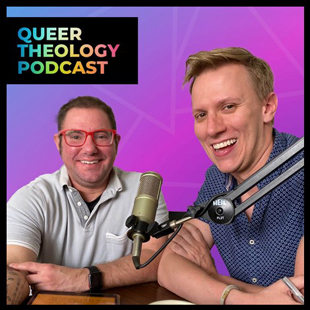When Father Shannon Kearns started the Queer Theology podcast with Brian Murphy in 2013, each episode focused on the lectionary scripture for the week (the lectionary is a schedule of Bible readings for each Sunday and for holy days). It was presented as a resource for ministers who wanted to add queer perspectives on scripture to their sermon preparation.
However, Queer Theology quickly became “church” in itself, offering listeners the fullness of a spiritual experience. The podcast is now in its tenth year and recently celebrated its 500th episode. It is the longest running Christian queer podcast, and it has grown to include queertheology.com, a web site where queer spiritual seekers of all kinds can find resources, get affirmation, take courses and workshops, and get connected to online communities.
For many queer Christians, Queer Theology has been and remains their only access to a space where Christianity and queerness coexist. While the number of queer affirming churches is certainly growing, acceptance of the lives and relationships of queer Christians does not always translate into a church’s robust engagement with the wounds and virtues of being queer and religious.
The Queer Theology podcast tends to both the wounds and the virtues, addressing the “clobber passages” most often weaponized against queer Christians and holding up the Bible as a text that centers the margins and provides a foundation for openness, non-conformity, radical love, multiplicity, and non-binary thinking. As Kearns and Murphy like to say, to “queer theology” is in many ways just to say that there is more than one way to read the Bible.
One of the podcast’s (likely lifesaving) contributions has been its ability to act as a spiritual companion for queer and trans Christians who do not, will not, or in some cases, should not read scripture alone. The approach-avoidance conflict of queer Christians, particularly those of us who grew up evangelical, can be intense: on one hand, we were taught that the Bible is the only way to know God, and on the other hand, we were taught that the Bible condemns us. Thus, we do not know how to read the Bible and feel safe; scripture itself is a source of trauma.
Because both Kearns and Murphy have endured this struggle themselves — and done the really hard theological, familial, social, and intrapersonal work to come out the other side — they are compassionate, trustworthy, and wise guides for the soul and body. For the “baby queer,” the podcast can act as a bridge from fear to a new understanding of God, of self, and of how The Bible ought to be read (spoiler alert: not literally!). For the more advanced seeker, the podcast offers resources to deepen faith, help others, and develop queer voices around issues of scripture, church, and God.
Crucially, Kearns and Murphy are not here to evangelize or convert. Their goal is the health and wholeness of the queer and trans community, who too often get the message that they must choose between religion/spirituality or their queer selves. So, if you are looking for ways to stay in your faith, there are episodes for how to do that well. If, however, you are looking to leave your faith, there are episodes for how to do that well. The goal is to bring back together what too much toxic theology and too many anti-queer churches have separated: to move queer folks from feeling split to feeling integrated.
